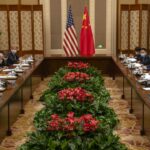The “Cross-Straits Scholars Face to Face” academic event concluded successfully in Xiamen, Fujian Province, East China, on Saturday. The event, themed “Containing a Common Voice: From Minnan Song to Gezi Ballad, Nanyin, and Opera,” aimed to enhance in-depth academic and cultural exchanges between scholars from the Chinese mainland and the island of Taiwan.
Co-hosted by Xiamen University and the Academy of Chinese Culture, the event was attended by nearly 100 experts. Experts from both sides of the Taiwan Strait called for enhanced face-to-face exchanges and promoted in-depth interaction between academia on both sides.
Wang San-Ching, a professor from National Cheng Kung University in Taiwan, along with Chen Geng, deputy director of Xiamen Minnan Culture Protection and Development Expert Committee and head of Xiamen Intangible Cultural Heritage Protection Center Expert Group, engaged in in-depth discussions on folk music and opera from both sides of the straits.
They delved into the creative development of Nanyin, an ancient Chinese folk music art form originating from Fujian Province, known as the “living fossil in the history of Chinese music.” Through physical demonstrations and contemporary research findings, they shared their respective views on Gezi Ballad to Gezi Opera. They reviewed the history, current situation, and trends of cross-strait folk art exchanges and cooperation, and discussed the protection and inheritance of non-traditional heritage.
Wang emphasized the significance of the content of Gezi Ballad, stating that songs such as Nanyin possess historical, ethnic, folklore, and cultural characteristics. Chen stressed the creative development of Nanyin in mainland China, highlighting the importance of innovative exploration while upholding traditions. He emphasized the need for collaboration across Taiwan Straits to breathe new life into traditional Chinese music and art.
The event promoted and restored normal academic exchanges between the two sides of the strait, deepened interaction among academic circles, advanced joint efforts to promote Chinese culture, and fostered mutual understanding.
Wang discussed the deepening cross-strait exchanges and cooperation in Nanyin and opera following China’s reform and opening-up. Chen highlighted the profound impact of cross-straits opera exchanges and the preservation of non-traditional heritage on the development of cross-strait folk art cooperation.
“We look forward to deepening folk art exchanges and cooperation between the two sides of Taiwan Straits in the future, allowing Chinese culture to flourish through the integration and development of both sides,” said Wang and Chen.
(Global Times)




